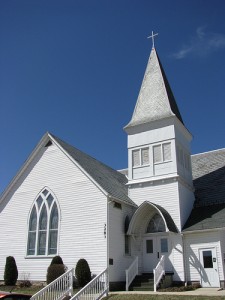Mainline Protestants
One of the most meaningful things I get to do in my work as a Ph.D. student in political science is assist Jim Wallis with a course he teaches at Georgetown every fall titled "Faith, Social Justice, and Public Life." Jim is well known as the founder and leader of Sojourners and as a lifelong advocate for social justice. Through lectures, discussions, and guest speakers, our students learn about how and why clergy and lay people of various religious backgrounds advocate for public policies as expressions of their faith commitments. This fall, the push for comprehensive immigration reform was one of the case studies we examined with our students.
I'm no expert in immigration policy. But, as a political scientist, I can offer an informed assessment about when, why, and how the House of Representatives will pass the reform in 2014. This will be the subject of a future post. For now, though, I want to highlight some distinctive features of the debate that I have noticed as an observer of religion in American politics. I do have a layman's interest in the theological justifications being offered in support of (and, perhaps surprisingly, against) comprehensive immigration reform. But for now, I will focus mostly on the politics.
Who are the mainline Protestants today? Vintage Protestants? The VPCC — Vanishing Progressive Christian Church? The Legacy Church?
Half a century ago, the denominations under the mainline umbrella dominated the American faith landscape. Now, after decades of declining numbers, only about one in five U.S. adults identifies with a mainline denomination such as United Methodists, the Episcopal Church, the Evangelical Lutheran Church in America, Presbyterian Church (USA), and American Baptists.
Could replacing the “mainline” name help stem the slide? The challenge came from scholar and Presbyterian pastor Carol Howard Merritt. Writing in the venerable Christian Century magazine, she called for a new brand that conveys her view of the mainline’s rising diversity and social justice leadership.
I've been speaking at many small colleges that have historical ties to the oldest mainline denominations in the U.S. I have been noticing something interesting: a terrific hunger for a deeper spirituality on the part of many young people who come from evangelical backgrounds like mine and also like me are looking for something outside of the right wing conservatism they come from.
I've also noticed that while some people in the so-called emergent evangelical movement are reaching out to these young people the leaders of the mainline denominations both locally and nationally often seem blind to a huge new opportunity for growth and renewal staring them in the face. That new opportunity is the scores of younger former evangelicals diving headlong out of the right wing evangelical churches.
Image via Church Sign Generator, http://www.signgenerator.org/church/
They may not be as large as Catholics or as active as evangelicals, but white mainline Protestants have a big thing going for them this election cycle: they are divided, and possibly persuadable.
That's according to a new poll released today (2/2/12), which found white mainline Protestants are more evenly split between President Obama and his Republican challengers than other religious groups.
"They're the most important ignored religious group in the country," said Dan Cox, research director at the Public Religion Research Institute, which conducted the poll in partnership with Religion News Service.
In a matchup between Obama and GOP front-runner Mitt Romney, mainline Protestant voters are nearly evenly divided, with 41 percent supporting Obama and 43 percent for Romney. The same holds true between Obama and former House Speaker Newt Gingrich — each is the choice of 41 percent of white mainline Protestants.
While it's generally not worth spilling any ink over Glenn Beck, his recent attacks on churches that preach "social justice" has rightly earned the condemnation of diverse faith leaders
For those who came to the Justice Revival's free opening night program (featuring former United Methodist District Superintendent and Texas State House Rep. Dr.
Whenever I hear those three little words -- "the latest poll" -- I generally tune out. Pollsters and survey-takers seldom ask the right questions, I've found, so the responses they get are less than reliable. One exception is the surveys conducted by The Pew Forum on Religion & Public Life, and the organization's U.S. Religious Landscape Survey, released Monday, June 23, proves why.
The Pew survey [...]
During the South Carolina Republican debate, Mike Huckabee garnered greatest applause when defending his views of wifely submission as part of his evangelical faith. The questioner quizzed Huckabee about being one of 131 signers of a 1998 USA Today ad by the Southern Baptist Convention that asserted, "a wife is to graciously submit herself to the servant leadership of her husband." Huckabee responded by saying "I am not the least bit ashamed of my faith." He joked that his own wife [...]
The denomination which I am now seeking to enter and belong to, the Episcopal Church, is a denominaton that many others are now seeking to depart.
Such a situation carries within it two things: danger and opportunity. The danger is self evident. The opportunty will come from listening to the jackhammer on our roof. The image of a hammer on the roof comes from my Bishop Greg Rickel. I've added "jack" to the "hammer" to note the severity of [...]
A week before Thanksgiving, I spoke in Lake Tahoe for the clergy convocation of the California-Nevada Conference of the United Methodist Church, a sprawling geography that comprises a wide array of congregations in big cities and small rural towns. The wide variety of clergy reflected that of the churches-the group included many women, persons of color, younger pastors, folks with a spectrum of theological views, and ordained and non-ordained leaders. It was obvious that this group of [...]


